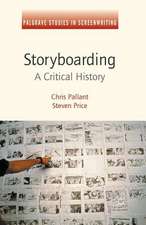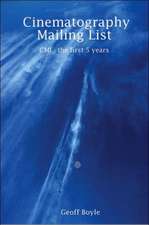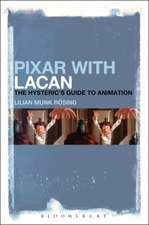Animated Landscapes: History, Form and Function
Editat de Chris Pallanten Limba Engleză Paperback – 22 feb 2017
| Toate formatele și edițiile | Preț | Express |
|---|---|---|
| Paperback (1) | 259.25 lei 6-8 săpt. | |
| Bloomsbury Publishing – 22 feb 2017 | 259.25 lei 6-8 săpt. | |
| Hardback (1) | 834.28 lei 6-8 săpt. | |
| Bloomsbury Publishing – 7 oct 2015 | 834.28 lei 6-8 săpt. |
Preț: 259.25 lei
Preț vechi: 332.09 lei
-22% Nou
Puncte Express: 389
Preț estimativ în valută:
49.61€ • 51.61$ • 40.96£
49.61€ • 51.61$ • 40.96£
Carte tipărită la comandă
Livrare economică 14-28 aprilie
Preluare comenzi: 021 569.72.76
Specificații
ISBN-13: 9781501320118
ISBN-10: 1501320114
Pagini: 336
Ilustrații: 30 bw illus
Dimensiuni: 152 x 229 x 21 mm
Greutate: 0.45 kg
Ediția:NIPPOD
Editura: Bloomsbury Publishing
Colecția Bloomsbury Academic
Locul publicării:New York, United States
ISBN-10: 1501320114
Pagini: 336
Ilustrații: 30 bw illus
Dimensiuni: 152 x 229 x 21 mm
Greutate: 0.45 kg
Ediția:NIPPOD
Editura: Bloomsbury Publishing
Colecția Bloomsbury Academic
Locul publicării:New York, United States
Caracteristici
A timely counterpoint to the dominance of character (be that either animated characters such as Mickey Mouse or real world personalities such as Walt Disney) that exists within animation and film studies scholarship
Notă biografică
Chris Pallant is a Senior Lecturer at Canterbury Christ Church University, UK. His research includes animation, filmmaking production practices and technologies, and videogames. He has published on a range of topics, including Disney feature animation, the 'cartoonism' of Quentin Tarantino, performance capture, and Rockstar Games.
Cuprins
List of IllustrationsAcknowledgementsIntroductionI - History: Formal Traditions1. Seeing in Dreams - The Shifting Landscapes of Drawn AnimationBryan Hawkins, Canterbury Christ Church University, UK2. The Stop Motion LandscapeChris Pallant, Canterbury Christ Church University, UK3. Pixar, 'The Road to Point Reyes', and the long history of landscapes in new visual technologiesMalcolm Cook, Birkbeck, University of London, UKII - History: National Perspectives4. Australian Animation - Landscape, Isolation and ConnectionsSteven Allen, Winchester University, UK5. Environmentalism and The Animated Landscape in Nausicaä of the Valley of the Wind (1984) and Princess Mononoke (1997)Melanie Chan, York St John University, UK6. Animating Shanshui: Chinese Landscapes in Animated Film, Art and PerformanceKiu-wai Chu, The University of Hong Kong7. Latvian Animation: Landscapes of ResistanceMihaela Mihailova, Yale University, USAIII - Form: Journeys Through Animated Space8. The Landscape in the Memory: Animated Travel DiariesMaría Lorenzo Hernández, Universitat Politecnica de Valencia9. Off the Rails: Animating Train JourneysBirgitta Hosea, University of the Arts, London, UK10. Between Setting and Character: A Taxonomy of Sentient Spaces in Fantasy FilmFran Pheasant-Kelly, University of Wolverhampton, UKIV - Form: Peripheral Perspectives11. The Metamorphosis of Place: Projection-Mapped AnimationDan Torre, RMIT, Australia12. Plasmatic Pitches, Temporal Tracks and Conceptual Courts: The Landscapes of Animated SportPaul Wells, Loughborough University, UK13. The Zombiefied Landscape: World War Z (2013), ParaNorman (2012), and the Politics of the Animated CorpseJames Newton, University of Kent, UKV - Function: Interactivity14. Evoking the Oracle: Visual Logic of Screen WorldsTom Klein, Loyola Marymount University, USA15. Beyond the Animated Landscape: Videogame Glitches and the SublimeAlan Meades, Canterbury Christ Church University, UKList of ContributorsBibliographyAnimation/Filmography/Other MediaIndex
Recenzii
This collection provides a rich and lively discussion on one of the most overlooked areas of animation-animated landscape, which, just as Pallant wants it to be, is to rebalance the long-term bias existing between character and landscape, which is related to the centrality of studies on character design and interpretation over reflections about landscapes. It ably explores the multivalent nature of animated landscape with an interdisciplinary and cross-disciplinary approach, which also deepens the reader's understanding of what animation is.
For so long animation studies literature has focused mainly on animated characters-at last a book that examines the other part of the frame: backgrounds and environments. Through historical analysis and theoretical considerations, Animated Landscapes brings attention to a significant but largely overlooked realm of animation aesthetics. The broad scope of essays by leading scholars in the field reflect the diversity of animation today.
Animated landscapes: they're not just 'backgrounds' anymore. This collection by established and emerging scholars directs our attention to an aspect of animation that has long been treated as secondary, if it was considered at all. Far from being painting in motion, or even a depiction of nature, landscaping can be mindscaping, and an active, if not dominant element of the film, new media, or gaming experience. The book is a welcome addition to the growing body of work in animation studies.
If Pallant's intention for his anthology was to question, interrogate and trace what it means for a landscape to become (and be considered) as 'animated', whilst shining the spotlight on an area that can at times appear to be 'virtually nothing' (p. 8), then the accomplishments of the included authors more than meet these goals.
For so long animation studies literature has focused mainly on animated characters-at last a book that examines the other part of the frame: backgrounds and environments. Through historical analysis and theoretical considerations, Animated Landscapes brings attention to a significant but largely overlooked realm of animation aesthetics. The broad scope of essays by leading scholars in the field reflect the diversity of animation today.
Animated landscapes: they're not just 'backgrounds' anymore. This collection by established and emerging scholars directs our attention to an aspect of animation that has long been treated as secondary, if it was considered at all. Far from being painting in motion, or even a depiction of nature, landscaping can be mindscaping, and an active, if not dominant element of the film, new media, or gaming experience. The book is a welcome addition to the growing body of work in animation studies.
If Pallant's intention for his anthology was to question, interrogate and trace what it means for a landscape to become (and be considered) as 'animated', whilst shining the spotlight on an area that can at times appear to be 'virtually nothing' (p. 8), then the accomplishments of the included authors more than meet these goals.























